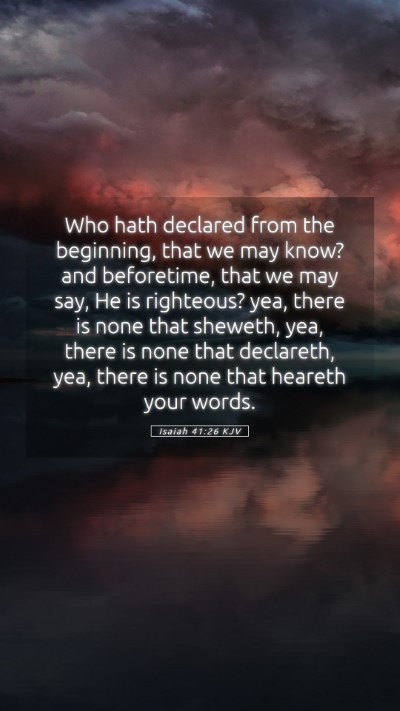Understanding Isaiah 41:26
Verse: "Who declared this from the beginning, that we may know? And beforehand, that we may say, 'He is righteous?' yea, there is none that sheweth, there is none that declareth, there is none that heareth your words." (Isaiah 41:26, KJV)
Isaiah 41:26 poses profound questions about prophecy and revelation, asserting the uniqueness of God in declaring the future. This verse calls attention to God's omnipotence and authority, emphasizing that none but God can predict or reveal the future with certainty.
Bible Verse Interpretations
- Matthew Henry: Henry emphasizes the assurance that God is the sole source of divine knowledge. He suggests that the rhetorical questions posed in this verse highlight the failure of false gods to predict or substantiate their claims. This reinforces the idea that God’s righteousness and divinity are unmatched.
- Albert Barnes: Barnes elaborates on the notion that the predictive power of God serves as a testament to His righteousness. He points out that the inability of idols and false prophets to declare the future demonstrates their impotence and the supremacy of the true God, which can be an indispensable insight for those engaging in Bible study groups.
- Adam Clarke: Clarke interprets this verse as a direct challenge to the idols of Israel. He sees in this challenge a broader context, addressing the need for authentic worship and recognition of God’s sovereignty. He suggests that true understanding of Scripture includes recognizing God’s role in foretelling events.
Bible Study Insights
This verse can provide valuable insights for those engaged in online Bible study or seeking Bible study resources. By examining the explicit challenges presented in Isaiah 41:26, individuals can develop a deeper Bible verse understanding and learn how to interpret biblical texts critically.
Key Themes
- Divine Sovereignty: The verse reinforces the concept of God's ultimate authority over all creation and history.
- True Worship: It invites the faithful to recognize and worship God alone, free from the distortions of idol worship.
- Prophecies as Proof: The fulfillment of God’s prophetic statements serves to validate His righteousness and supremacy.
Applications of Isaiah 41:26
The application of Isaiah 41:26 can greatly enhance your Bible study topics. By reflecting on its implications, believers can learn to:
- Trust in God's Plan: Recognizing that God has foreknowledge and control can encourage faith in uncertain times.
- Engage in Personal Reflection: Examine the integrity and reliability of sources we turn to for truth.
- Discuss the Righteousness of God: Foster discussions in Bible study groups about how God’s prophecies shape our understanding of His character.
Cross References
Isaiah 41:26 can be correlated with several other scriptures that echo similar themes:
- Isaiah 46:9-10: Declares God as the one who declares the end from the beginning.
- Jeremiah 29:11: God has plans for a hope and a future, emphasizing His knowledge and authority over history.
- Amos 3:7: Shows that the Lord does nothing without revealing His plan to His servants the prophets.
Conclusion
In summary, Isaiah 41:26 offers profound insight into the nature of God’s sovereignty and prophecy. As individuals seek Bible verse commentary and Biblical exegesis, this verse serves as an essential foundation for understanding the unique position of God as the ultimate declarer of truth and future events. By engaging deeply with the text and utilizing various Bible study tools, believers can cultivate a richer understanding of Scripture and its implications for their lives.


